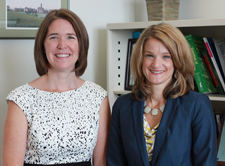 |
|
|
Kathleen Biebel, PhD, (left) and Nancy Byatt, DO, are leading the launch of the new Massachusetts program to better identify and treat depression in mothers during and after pregnancy. |
UMass Medical School is leading the launch of a statewide program to better identify and treat depression in mothers during and after pregnancy, by providing rapid access to psychiatric expertise and mental health resources to pregnant and postpartum women’s front line health care providers. Beginning July 1, the Massachusetts Child Psychiatry Access Project (MCPAP) for Moms initiative will assist providers, including nurses, social workers and allied health professionals as well as primary care physicians and obstetricians, with:
- Training and tools on evidence-based guidelines for depression screening, treatment and referral, including the risk and benefits of medications, and how to discuss screening results and treatment options with patients;
- Real-time telephone consultation with program psychiatrists and a staff of care coordinators; and;
- Links to community-based resources such as support groups to help women get services close to home.
“The primary target of MCPAP for Moms is obstetrical providers,” said Nancy Byatt, DO, MBA, FAPM, assistant professor of psychiatry and obstetrics & gynecology at UMMS and medical director for the program. “Obstetricians are seeing these women all the time but often don’t have the resources or tools to manage depression or other mental health concerns, and as a result they may not screen for it. Even if they do screen for depression, they may not know what to do next when a screen suggests symptoms of depression.”
As many as one in five women experience depression during pregnancy or in the first year postpartum, but most do not receive treatment despite the potentially devastating consequences of undiagnosed and untreated depression. As highlighted in a recent New York Times series, maternal depression is “more common and varied than previously thought” and can lead to tragic consequences.
“We are also targeting family practitioners who provide obstetrics, pediatricians and psychiatrists who may need support regarding medication during pregnancy and breastfeeding to feel comfortable treating these women,” said Dr. Byatt. “With MCPAP for Moms, any provider serving pregnant or postpartum woman can call us and get the help they need to make informed, careful decisions.”
Through this program, which is funded by the Massachusetts Department of Mental Health, providers will be able to talk with an on-call perinatal psychiatrist to get answers to questions about assessment, diagnosis, treatment and community resources from 9 a.m. to 5 p.m. Monday through Friday. Providers will also be able to talk with a care coordinator who can help identify and access mental health supports for women in their local communities.
“The goal of making the consultation and support available is to enable the front line provider to continue caring for a patient,” said Kathleen Biebel, PhD, research assistant professor of psychiatry and MCPAP for Moms program director. “MCPAP for Moms psychiatrists will support providers as they strive to meet the mental health needs of their pregnant and postpartum patients.”
The new initiative is an expansion of the highly successful Massachusetts Child Psychiatry Access Project that UMMS and the Massachusetts Department of Mental Health established in 2005 to improve mental health care for children in Massachusetts.
“MCPAP has become a national model,” said Byatt. “Along with our partners and allies, including the Massachusetts Postpartum Depression Commission MSPP Interface and MotherWoman, we’re excited to build on the success of MCPAP by expanding it to address depression and other mental health concerns among pregnant and postpartum women.”
Related link on UMassMedNow:
Byatt to Telegram & Gazette: postpartum depression can interfere with mother-child bond: Statewide initiatives will expand access to mental health services for new mothers